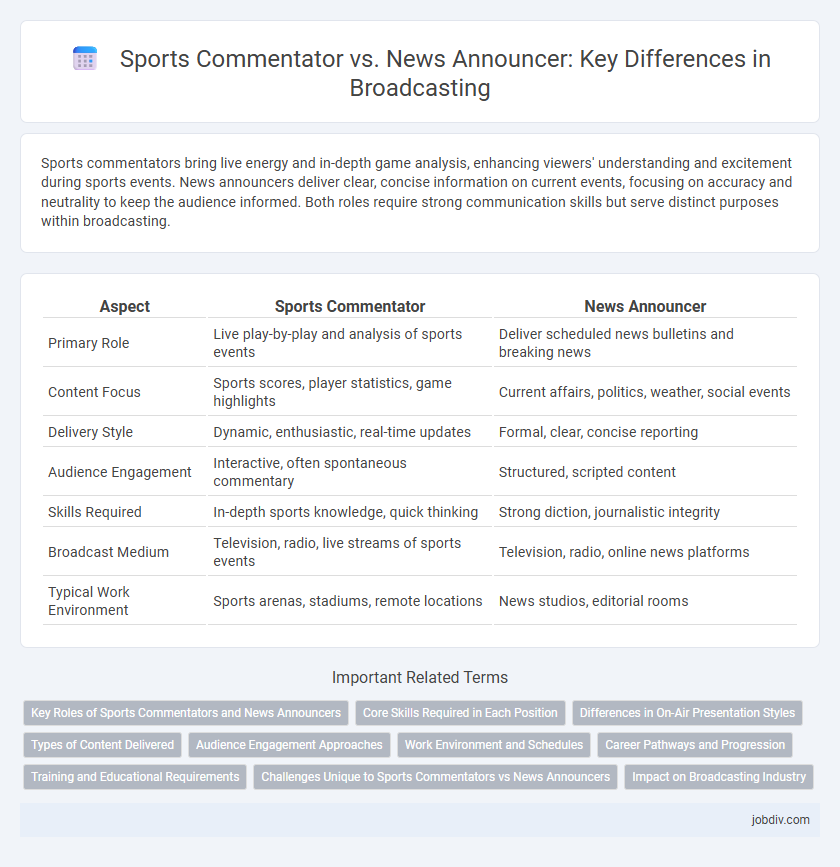Sports commentators bring live energy and in-depth game analysis, enhancing viewers' understanding and excitement during sports events. News announcers deliver clear, concise information on current events, focusing on accuracy and neutrality to keep the audience informed. Both roles require strong communication skills but serve distinct purposes within broadcasting.
Table of Comparison
| Aspect | Sports Commentator | News Announcer |
|---|---|---|
| Primary Role | Live play-by-play and analysis of sports events | Deliver scheduled news bulletins and breaking news |
| Content Focus | Sports scores, player statistics, game highlights | Current affairs, politics, weather, social events |
| Delivery Style | Dynamic, enthusiastic, real-time updates | Formal, clear, concise reporting |
| Audience Engagement | Interactive, often spontaneous commentary | Structured, scripted content |
| Skills Required | In-depth sports knowledge, quick thinking | Strong diction, journalistic integrity |
| Broadcast Medium | Television, radio, live streams of sports events | Television, radio, online news platforms |
| Typical Work Environment | Sports arenas, stadiums, remote locations | News studios, editorial rooms |
Key Roles of Sports Commentators and News Announcers
Sports commentators deliver live, dynamic play-by-play narration and expert analysis during athletic events, enhancing viewer engagement through real-time excitement and detailed knowledge of the sport. News announcers present factual information clearly and concisely, often covering breaking news, weather updates, and public interest stories to inform audiences promptly and accurately. Both roles require strong communication skills but differ in tone and content focus, with sports commentators emphasizing entertainment and sports expertise, while news announcers prioritize reliability and objectivity.
Core Skills Required in Each Position
Sports commentators require expertise in dynamic live narration, quick analytical thinking, and a deep understanding of game rules and athlete statistics to engage and inform viewers in real-time. News announcers must possess strong articulation, impeccable grammar, and proficiency in delivering clear, concise reports on diverse topics under tight deadlines. Both roles demand excellent vocal control and audience connection but differ primarily in content specialization and pace of delivery.
Differences in On-Air Presentation Styles
Sports commentators use dynamic and energetic tones to capture the excitement of live games, often incorporating real-time analysis and emotional engagement with the audience. News announcers maintain a neutral, authoritative voice, focusing on clear delivery of factual information and adherence to journalistic standards. The difference in presentation reflects the distinct goals: sports commentary emphasizes storytelling and immediacy, while news announcing prioritizes accuracy and objectivity.
Types of Content Delivered
Sports commentators specialize in live play-by-play narration and in-depth analysis of games, athletes, and sports strategies, providing real-time updates and expert insights tailored to sports audiences. News announcers deliver a wide range of content including breaking news, weather reports, and human interest stories, focusing on clear, concise information dissemination across various topics. Both roles require strong communication skills, but their content delivery is tailored to engage their distinct audiences effectively.
Audience Engagement Approaches
Sports commentators enhance audience engagement by delivering dynamic play-by-play narration and real-time analysis that captures the excitement of live events. News announcers engage viewers through clear, concise reporting and maintaining an authoritative tone that builds trust and credibility. Both roles leverage vocal tone, pacing, and emotional connection to sustain viewer interest and convey information effectively.
Work Environment and Schedules
Sports commentators often work in dynamic, live-event settings such as stadiums and arenas, requiring flexible schedules that include evenings, weekends, and travel for games. News announcers typically operate from studio environments with more structured hours aligned with regular news cycles, often including early mornings or late-night shifts. Both roles demand the ability to adapt quickly, but sports commentators face more unpredictable and varied work environments due to the nature of sporting events.
Career Pathways and Progression
Sports commentators typically start with a strong background in athletics or sports journalism, gaining experience through local radio, college sports, or internships; advancement often involves moving to regional sports networks before securing national roles. News announcers usually pursue degrees in journalism or communications, beginning their careers with smaller local stations or print media, gradually building their on-air presence and credibility to reach major news networks. Both careers demand continuous skill development, including on-air delivery, research abilities, and audience engagement strategies, to progress within competitive broadcasting industries.
Training and Educational Requirements
Sports commentators typically require specialized training in sports journalism, often earning degrees in broadcasting or communications with a focus on sports media. News announcers usually pursue broader education in journalism or mass communication, emphasizing skills in news reporting, writing, and delivery across various topics. Both professions benefit from internships and practical experience in live broadcasting environments to develop their on-air presence and technical proficiency.
Challenges Unique to Sports Commentators vs News Announcers
Sports commentators face the challenge of delivering real-time, fast-paced play-by-play narration while maintaining accuracy and excitement under intense time pressure. Unlike news announcers, who typically work from prepared scripts and can moderate their tone, sports commentators must constantly adapt to unpredictable events and engage audiences with dynamic energy. The necessity to combine expert sports knowledge with quick thinking and vocal stamina distinguishes sports commentary from the structured delivery required in news announcing.
Impact on Broadcasting Industry
Sports commentators enhance viewer engagement by delivering live play-by-play analysis and emotional storytelling, which drives higher audience retention during sporting events. News announcers contribute to broadcasting integrity by providing accurate, clear, and timely information critical for public awareness and trust. Both roles shape the broadcasting industry by addressing distinct audience needs, thereby expanding content diversity and viewership reach.
Sports Commentator vs News Announcer Infographic

 jobdiv.com
jobdiv.com